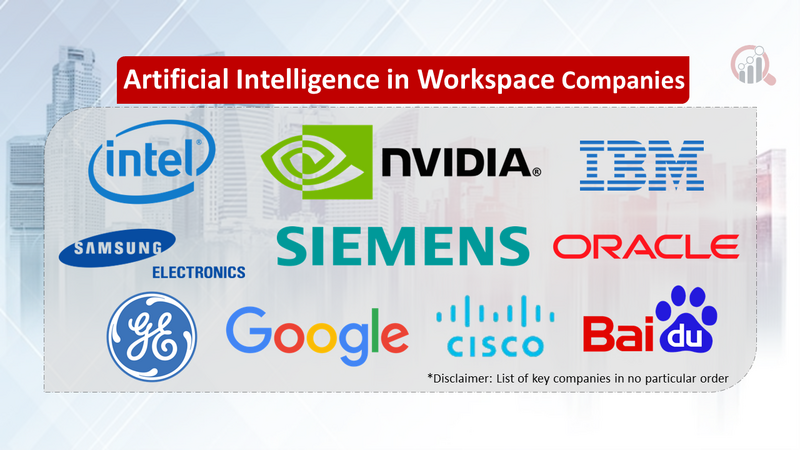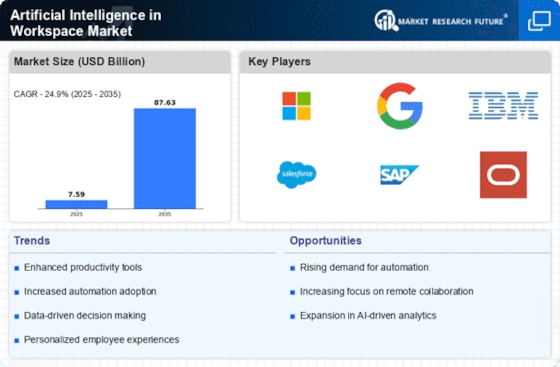Top Industry Leaders in the Artificial Intelligence in Workspace Market

Competitive Landscape of Artificial Intelligence in Workspace Market:
The Artificial Intelligence in Workspace Market into the workplace is revolutionizing how we work, manage, and collaborate. This rapidly evolving market presents a dynamic competitive landscape, with established tech giants and nimble startups vying for dominance. Understanding the key players, their strategies, and market dynamics is crucial for navigating this exciting and lucrative space.
Key Players:
- Intel (US)
- Nvidia (US)
- IBM (US)
- Samsung Electronics (South Korea)
- Siemens AG (Germany)
- Cisco (US)
- General Electric (US)
- Google (US)
- Baidu Inc (China)
- Oracle (US)
Strategies Adopted:
- Platform-based approach:Leading players like Google Workspace and Microsoft 365 offer integrated AI functionalities within their existing platforms, making adoption seamless for existing users.
- Specialization and partnerships: Startups are focusing on specific AI applications and collaborating with established players to leverage their reach and expertise. This allows them to expand their market reach without incurring high development costs.
- Open-source frameworks:The rise of open-source AI frameworks like TensorFlow and PyTorch is democratizing access to AI tools and enabling smaller players to develop innovative solutions.
Factors for Market Share Analysis:
- Product offerings and breadth of functionalities:The comprehensiveness and effectiveness of AI solutions in addressing various workplace needs play a crucial role in market share.
- User experience and ease of adoption:Intuitive interfaces and seamless integration with existing workflows are essential for user adoption and success.
- Pricing and affordability:Competitive pricing models and flexible subscription options are key for attracting and retaining customers, particularly smaller businesses.
- Security and data privacy:Robust security measures and transparent data handling practices are increasingly important as businesses entrust sensitive data to AI systems.
- Brand awareness and reputation:Established brand names and positive customer reviews hold significant weight in influencing market share.
New and Emerging Companies:
- HyperAutomation startups:Companies like UiPath and Automation Anywhere are leading the charge in automating routine tasks and processes, freeing up human employees for higher-value work.
- AI-powered communication tools:Startups like Krisp and Otter.ai are using AI to improve communication through noise cancellation, real-time transcription, and sentiment analysis.
- Employee well-being platforms:Companies like Headspace and Calm are leveraging AI to promote mental health and well-being within the workplace, leading to improved employee satisfaction and productivity.
Current Investment Trends:
- Focus on vertical solutions:Investors are increasingly interested in AI solutions tailored to specific industries and functions, recognizing the potential for higher returns and market differentiation.
- Emphasis on ethical AI:Growing concerns about bias and data privacy are driving investments in AI solutions that are fair, transparent, and accountable.
- Rise of hybrid work models:The shift towards hybrid work models is creating demand for AI-powered tools that facilitate seamless collaboration and communication across remote teams.
- Integration with blockchain and IoT:The convergence of AI with other emerging technologies like blockchain and the Internet of Things (IoT) is opening up new opportunities for automating workflows and optimizing operations.
Latest Company Updates:
January 3, 2024, Microsoft unveils Project Cortex, an AI-powered knowledge management platform that integrates with Microsoft Teams and SharePoint to improve information discovery and collaboration.
December 19, 2023, Google Workspace announces the expansion of Duet AI, its generative AI tool, to Gmail and Docs, offering features like automatic email replies and document summarization.











